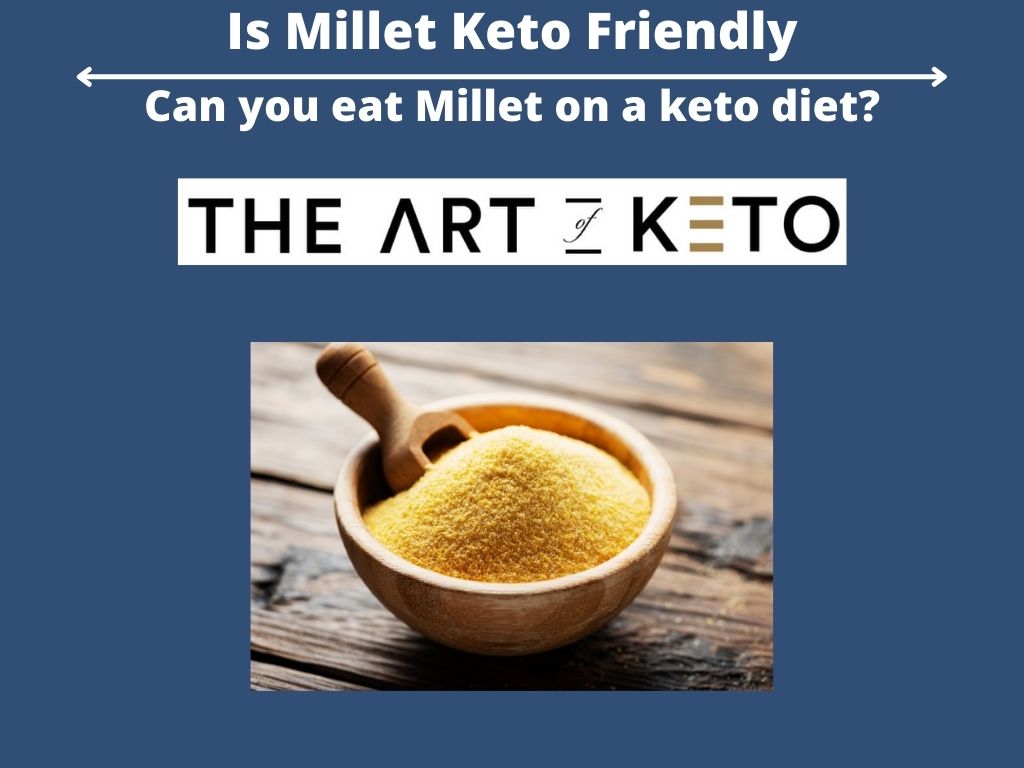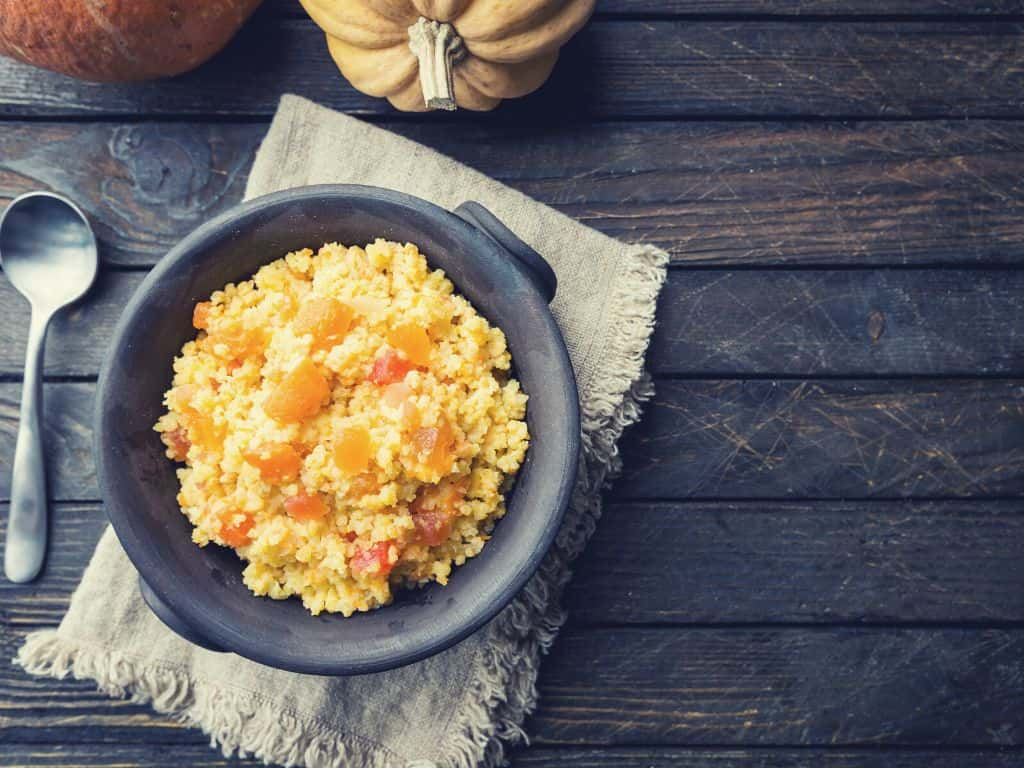The gluten-free and nutrition-packed millet is one of the healthiest grains to add to your daily diet. But does this apply to the ketogenic diet? Is millet keto friendly? The short answer is No! Millet is not keto friendly.

Let’s tell you why you should steer clear of millet if you follow a ketogenic lifestyle. We will also list down the best millet alternatives that are keto-friendly. So, continue reading!
What is Millet?
Millet is a highly nutritious but vastly ignored whole grain. It’s an ancient grain and has been around for thousands of years. It’s arguably one of the first grains cultivated by humankind dating back 10,000 years.
There are different types of millet, but the most popular one is pearl millet produced in the South-East Asian regions of India, Pakistan, and Nepal, where it’s commonly known as Bajra.

Over the past few years, as the gluten-free craze took over, more and more health and fitness enthusiasts started learning about millet and its incredible health benefits. It prevents diabetes, manages celiac disease, controls blood sugar, strengthens the heart, and offers many other benefits.
Today, Millet is one of the most popular choices among people who want to live a low-carb, gluten-free diet.
Let’s take a look at the nutritional profile of Millet.
Nutritional Value of Millets
The nutritional value of 100 grams of raw Millet is:
Total calories: 378
- Water: 8.67 g
- Energy: 1582 kJ
- Fat: 4.2 g
- Carbohydrates: 72 g
- Protein: 11 g
- Fiber: 8.5 g
Millets are also a rich source of minerals, antioxidants, and amino acids.
Is Millet Keto Friendly?
Keto is no longer a diet trend or a health craze; keto has become a lifestyle for many people. The ketogenic diet is a high fat, moderate protein, and low carb.
You usually need between 20g to 50g of carbohydrates on a ketogenic diet. Eating a high fat and low carb diet starts burning stored fat to fuel the body through ketosis.
If you are following a strict keto lifestyle and want to stay in ketosis all the time, you should avoid grains. This is because a single serving of most grains can exceed your daily carb limit, kicking you out of ketosis.
So, can you eat grain on keto? Yes and no. You can eat keto-friendly grains that are gluten-free and low in carbs. This brings us to the main concern: Is millet keto-friendly?

Millet is a cereal grain high in carbs, so it should not be included in a keto diet. Millet and other grains are high in carbohydrates and end ketosis. The mantra of following a ketogenic lifestyle is to eat high a fat and low-carb daily diet.
Just 100g of raw millet contains 72 grams of carbohydrates, which is a significantly high amount given that you are only allowed to eat 20 grams to 50 grams of daily carbs on keto. The body will start using carbs from millet for energy.
So, millet is out of the question when it comes to following a ketogenic lifestyle, as it will halt your progress.
To conclude, millet is not keto friendly. Always say no to it if you’re following a keto diet.
Potential Millet Alternative on Keto?
Whole grains are an excellent and inexpensive source of energy, fiber, and nutrients. However, grains and foods made from grains (mainly processed ones) are very high in carbohydrates. Fortunately, some keto-friendly grains are the perfect alternative to high-carb grains, like millet.
Here are some super-healthy grains to make a part of your keto lifestyle:
1. Bulgur
One cup of cooked bulgur has only 22 grams of net carbs. Bulgur is a grain made of cracked wheat berries. It is widely used in Middle Eastern and Mediterranean dishes. The grain has a nutty taste and a chewy texture, so it is excellent to incorporate in salads.
- Oats
One cup of cooked oats has 23 grams of carbs. Oats are a popular grain for breakfast bowls and smoothies. It is super versatile and can be cooked as a savory dish or used in desserts and snacks. Overall, oats are a great grain to incorporate into your keto diet.
- Quinoa
There are 24 grams of carbs in one cup of cooked quinoa. This pseudocereal grain is super rich in proteins and offers a wide range of health benefits. Quinoa salads are a great lunch option when you are on a keto diet.
- Spelt
This ancient grain is protein-rich and serves as a great alternative to rice. However, it is not gluten-free. So, if you are sensitive to gluten, avoid this grain on your keto diet. Instead, opt for other options from this list.
- Barley
Barley is another popular grain widely used in packaged cereals. However, it is best to eat it as a whole grain. Barley has a slight sweetness and is high in fiber. However, like spelt, barley isn’t gluten-free either.
- Wild Rice
Wild rice grows in water and has an earthy taste. It provides a healthy mix of protein and fiber. If you are a rice eater, it serves as a great substitute. Keto followers can use wild rice to create a number of healthy dishes.
- Buckwheat
Buckwheat is a gluten-free pseudocereal grain excellent for people following a keto or low-carb diet. This superfood is an excellent source of protein, fiber, and energy. You can find buckwheat noodles, vermicelli, cereal, and even milk.
- Einkorn Wheat
Einkorn contains gluten but is super fiber-rich and improves digestion. Typically, you should avoid processed einkorn products. However, you can use einkorn flour for baking when following a keto diet.
Wrapping Up
Grains are not generally recommended on a keto diet because they have a high amount of carbohydrates. However, you can go for keto-friendly low-carb whole grains such as quinoa, oats, and barley.
These grains are the perfect source of healthy carbs, nutrients, and quick-releasing energy for keto eating patterns.
Make sure you consume them in their raw or least-processed form. Moreover, rather than eating these grains as pasta, crackers, or bread, try to enjoy them as whole grains to avoid food additives and sugar.
Click on one of the links below to learn more about keto friendly foods: